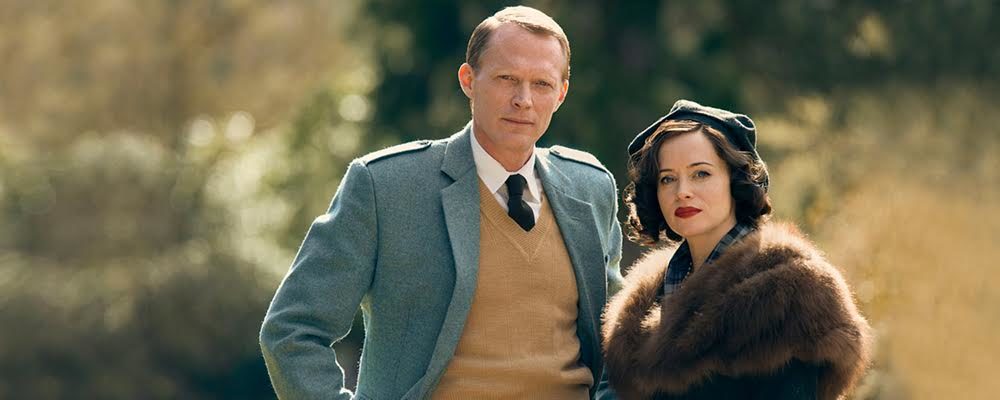‘A Very British Scandal’: Claire Foy and Paul Bettany Are Wickedly Good as Doomed Duke and Duchess
Sandra Miska
Claire Foy and Paul Bettany find themselves caught up in the divorce of the century in Amazon’s three-part docudrama “A Very British Scandal.” Based on a very true British story, the pair play the infamous Duke and Duchess of Argyll, whose 1963 divorce made headlines in the UK press due to the salacious details that became public. Although both parties were guilty of bad behavior, the duchess, née Margaret Whigham, was the one who received an epic slut-shaming. In an age of trial by social media and the in-depth access to the Johnny Depp-Amber Heard saga, a series about an acrimonious high-profile divorce, the first of its kind to be covered so extensively by the British press, is rather relevant.
“A Very British Scandal,” which is a follow-up to the “A Very English Scandal,” the 2018 limited series that starred Hugh Grant as a corrupt politician who conspired to kill his gay ex-lover, centers on another true story that rocked Britain around that same period, a story that also started with passion and spiraled into the stuff of nightmares. Although the Duke, Ian Campbell, never puts a hit out on Margaret, he comes dangerously close to killing her on at least one occasion depicted here.
By the time Margaret, a Scottish heiress, and Ian, then a heir to a Scottish dukedom, meet on a train in the late forties, he has been admiring her from afar for quite some time, or so he claims. Although she is at this point on the verge of being divorced from her first husband, he is still married to his second wife, Louise, a.k.a. Oui Oui (Sophia Myles), the mother of his two sons. He’s not yet divorced from her when he proposes to Margaret and she gleefully accepts, even introducing him to her parents. Soon, Oui Oui sends her a scathing letter in which she states she wishes to see Margaret publicly humiliated for retribution for how she humiliated her, but neither woman could have predicted just how prescient her words would be.
Later, Ian’s first wife, Janet (Sophie Ward), the mother of his daughter, warns her that he will just use like he did her two predecessors and trade her in for another heiress as soon as she’s served her purpose, but Margaret writes her off as just being scornful, telling her she’s not a “little girl” like her and Oui Oui. But Margaret learns the hard way that no matter how strong a woman may be, it’s impossible for her to protect herself from the abuses of the self-deluded addict and spendthrift with whom she now shares a bed and a home.
Sadly, by the time Margaret realizes that Ian’s marriage to her was a calculated maneuver on his part, it’s too late. As her father, George (Richard McCabe), is a self-made man and not an aristocrat, she is dazzled by Ian’s title and his ancestral home, which he inherits around the time they first meet, and spends much of her inheritance restoring it to its former glory. Ian bleeds dry his wife and father-in-law while he engages in useless endeavors. The marriage reaches a final breaking point after George refuses to give Ian any more money, which causes Ian, who has been mentally unstable since his time as a prisoner of war in WII, to fly into a rage.
Although both Ian and Margaret engage in extramarital affairs, it is Margaret who leaves behind evidence, the most damning being a polaroid photo of her performing oral sex on an unidentified man. Her being a woman also doesn’t help her situation, as her every movement and relationship are scrutinized, including her friendship with a gay man, Peter Combe (Timothy Renouf). Surprisingly, or not, those who are most critical of her are other women, including a few who blame her for Ian’s dissolute behavior, stating he would be a better man if she was a better wife. One of her closest friends, Maureen Guinness (Julia Davis), even scorns her for her sexual escapades making the paper, not because she care so much about her friend’s reputation, but because she resents the lower classes now being privy to what the wealthy and privileged do behind closed doors.
Because of the double standard, the viewer cannot help but feel for Margaret. While she can be admired for being a woman who owns her own sexuality, she’s hardly a role model. She takes the aforementioned letter from Oui Oui and uses it to forge a love letter in order to cast doubt in Ian’s mind about the paternity of his sons, her goal being to disinherit them, as she fears being kicked out of their home once the oldest becomes duke. She even goes as far as to ask a friend, Diana Napier (Camilla Rutherford), to help her secure a baby she can pass as her own to Ian.
Foy is such a great actress and gives such a nuanced performance that we stay with Margaret the whole time, even when her behavior is downright villainous. As for Bettany, he seems to be having a wickedly good time bringing his A game to play the odious duke. One of the best scenes is a simple dinner scene in which Ian attempts to negotiate with Margaret, and she makes some powerful accusations that he doesn’t attempt to deny, his true self shining through. The series is captivating right up to the final ruling in court and abrupt ending.
“A Very British Scandal” begins streaming April 22 on Amazon Prime Video.

